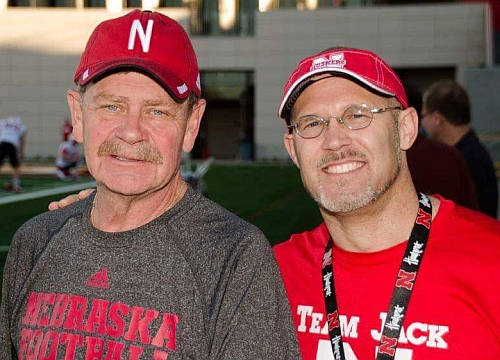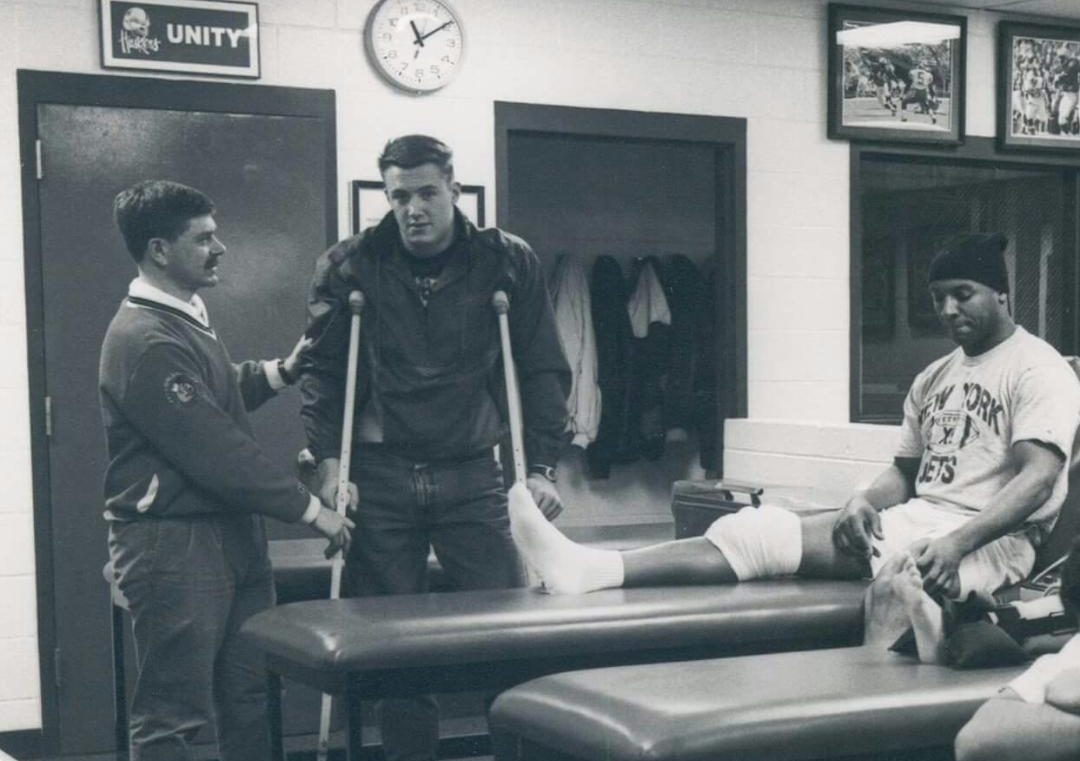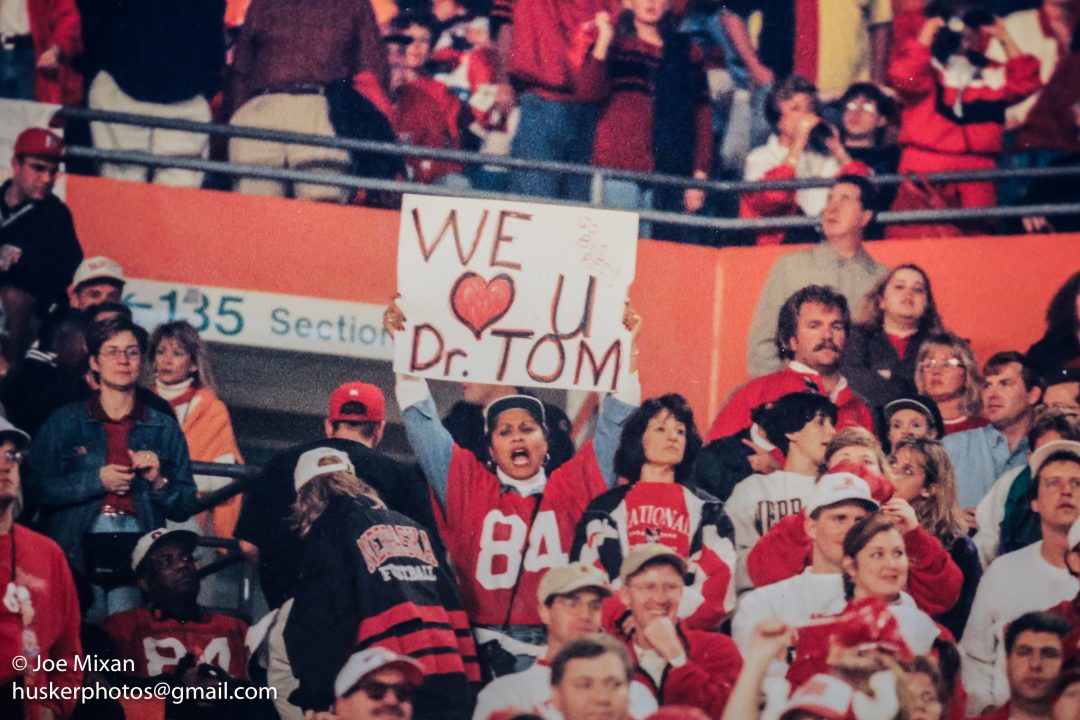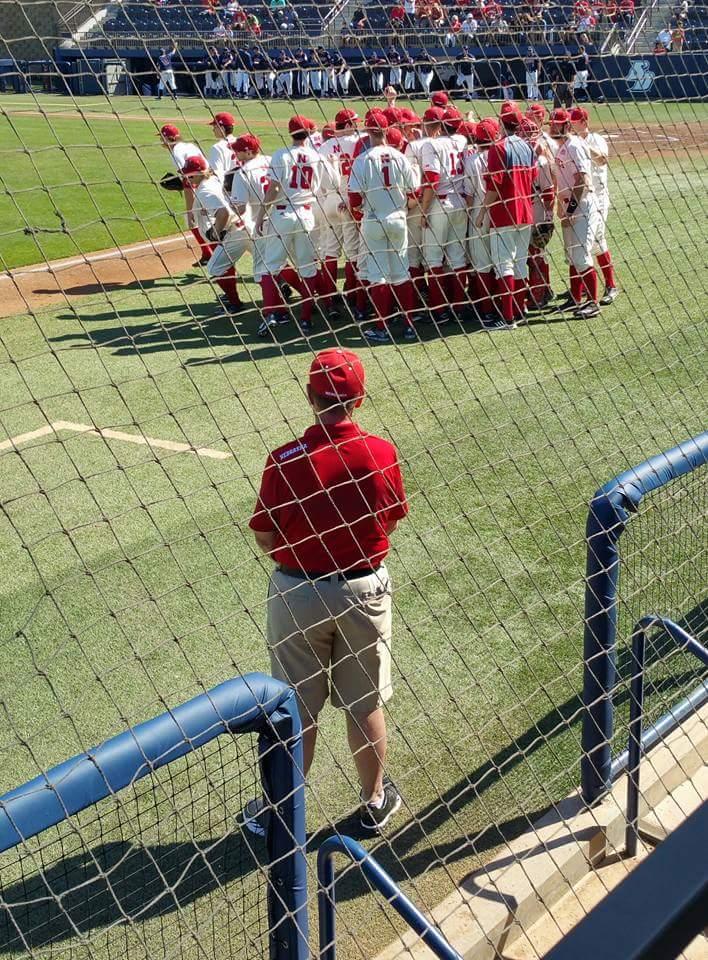Anatomy of an Era: Jerry Weber, Athletic Trainer, Part 2

Excerpted from Chapter 43, No Place Like Nebraska: Anatomy of an Era, Vol. 1 by Paul Koch
Anatomy of an Era: Jerry Weber, Athletic Trainer, Part 2
Jerry Weber: (Tom Osborne) surrounded himself with great coaches and great people. He certainly led the way, set the tone as far as how you’re supposed to treat people. It isn’t just the X’s and O’s and getting the A’s and B’s. There’s a spiritual element to it. There’s an element of leadership and mentorship. His whole thing is mentorship, you know. I guess that’s one thing we could all certainly use. I look at my career as being a lifelong mentoring system, where you like to lead by example, and think that kids look up to you and appreciate you because you treat them right and you show them the right way to do it.
They’ll come in and tell you what they did last weekend. And they have these stories, “Oh man, I did this and I did that..” And I say, ‘Wait a minute. You had a good time and that was cool, but what did you learn from that?’ And they say, “Oh yeah. Man, I ain’t going to do that again.” I try to emphasize some of those things. And then, of course, they go back and do it again and then you hear about it. And I go to them, ‘Hey, I thought we talked about that?’ And they go, “Yeah, I know. I just…” And I say, ‘Hey, well here’s what you do: Don’t hang out with them or do this..’ And the ones who do listen to you? They come back around and say, “You know what? You were right. I was screwing up back then.” There’s so many, Paul. I could go on and on if I had a roster in front of me.

Jerry Weber making the rounds in the old South Stadium Training Room (Nebr. Sports Info)
Q: You talked about Coach Osborne and his mentoring. Could you expound upon his leadership coming from the top down? Anything that was unique, original, special about his particular brand of leadership?
JW: I think Coach Osborne was -and I don’t think this was intentional- I think it’s just the way he lives his life: He always led by example. There’s never any question about his faith and his belief system. He never really forced that down on people, but it was very apparent that he felt it was strong in athletes’ lives and he would live his by example, would show that. He would also point it out, “Guys, take this any way you want to, but there are certain things that you need to guide you in life. What you have to ask yourself is, ‘Is this the right way to do it or the wrong way to do it?’” Another way he put it was, “Could you tell your grandmother what you did last night?” Things like that. And it would kind of get their attention.
But he was also smart, he surrounded himself with really good people. And at some point he also -because of the people he worked with- he never had to be the bad guy. He could be, but usually he led with his expectations. And if you hadn’t met the expectations there would be consequences, but he never had to drop the hammer. But Charlie McBride would certainly drop the hammer, and Frank Solich would drop the hammer, or Jack Pierce, whoever it was. And it wasn’t like they carried the message of, “Coach Osborne says you’re screwing up.” It was more like it was coming straight from the man, “Hey, you’re screwing up! And you know it. And we don’t -the total worldwide we– don’t appreciate that or we don’t expect that. Our expectations of you are higher.” He was able to do that, and a lot of people can’t get that across to their staffs and their athletes, and I don’t know how he did that.
I’ll never figure it out, but he still does it today in leadership. He certainly will drop the hammer, because I think his role as an athletic director is a little different, because you have to be a little more forceful. I think he was just able to get his ideas across very subtly, sometimes. He could be direct, but it was usually innuendo or subtlety. And if you didn’t get it, there was somebody next to you who was gonna get it and figure it out for you. I think that was just his strength. Quiet leadership.
And I know the man’s brilliant, so I don’t think it was all totally unintentional, either. He understands what works and what doesn’t work. He’s able to get peoples’ attention and get you to understand goals. He’s a genius.

A sign of the times (Joe Mixan)
Q: Any recollections about Charlie or Frank, like you were saying?
JW: Charlie was probably, in that group of coaches, kind of the roughest edge of any of them: verbally, vocally, physically. I’ve seen him on his tiptoes and scream at a guy face to face, whether it was Christian or Jason or Grant or Tomich, any of those guys. He would dress you down. But the next moment he’d have his arm on their shoulder telling them they did this and this right, and “cut the other crap out” again. (laughs) But the guys loved him. Talk to any of those guys. He was like total love/hate relationship sometimes.
It was kind of fun, almost like seeing him go into an act sometimes. He knew what buttons he could press and what buttons he couldn’t press on others, and he would press them all. I think he really did have a little bit of an act he would go into. (laughs) Frank wasn’t quite like that at all. Frank was more into the teaching aspect of it. Charlie was a great teacher, but he went about it a little differently.
Frank had a great rapport with the athletes and was really an athlete’s coach. I think he was. He really was empathetic with the athletes. He would really listen to them, he liked to hear their story and he’d help them work through any problems they had. And as far as a coach, he was a great technician. They appreciated that and understood. He really didn’t have a Napoleon complex like some guys his size would. The power he had, that could turn very negative, but he never did.
Q: Anyone else on that staff?
JW: Turner (Gill), especially, he was one of my athletes. Then his hardship and problems with his foot and leg, and he overcame that and became a superstar and is probably still the most beloved quarterback we’ve ever had here. A Christian, quiet demeanor, never brash, a total leader by example. Turner was a great technician, just a great comrade and friend to his athletes. There was a great love there. I think he picked a few things up from Coach Osborne: his faith and belief in human nature, and he did that when he was an assistant coach and athlete.
Q: Do you have a shining moment in your career?
JW: Oh, wow. I guess, for me, it would be a bunch of kids who overcame terrible injuries to go play, and without your help they never would have overcome some of those problems. A lot of them, no one will even remember their names. They came back and did a great job. They never played in the pros and they’re not out on the wall of All-Americans even. It’s just that accomplishment in being a vital part of getting that kid back to being a healthy athlete.
Q: Any memorable road trip or bowl game stands out to you most?
JW: It’s kind of weird, but it’s the one where we got our butt kicked. It was the Citrus Bowl. Because it was kind of a turning point, that season and that bowl was a turning point in Coach Osborne’s career, I think. We were not very good, they out-athleted us, they just did some things. That’s when Tom figured if we wanted to compete with the Georgia Techs, the Miamis, the Florida States, we have to change how we recruit, how we play on defense and how we do certain things.
And he did it. And that’s not easy to do when you’ve been playing a certain way and doing a certain thing for years and years and years. That sounds weird, but it became a very emotional game. At halftime Tom made the comment that, “I may not be here next year. You guys can’t play like this…” And all of a sudden you’re thinking, “Uh oh, he’s retiring.”
And other bowls, other trips? The ’99 Fiesta Bowl, that was very memorable. Eric Crouch was a sophomore, we just lit ’em up, and we’d lost to Texas earlier that year: Correll Buckhalter going across the goal line, he tried to extend it across the goal line and instead fumbles, so instead of being up and going away with the win they got the ball back and marched down the field. And then we came back and kicked Tennessee’s butt in that bowl game. We were probably the best team in the country at the end of that season, and it kicked Eric’s career off. He was a great athlete and a great player.
Obviously, there’s the ’97 win when Scott Frost took us to the national championship against Peyton Manning. Our defense just swarmed and picked them apart. And Joel Makovicka running? But I’m not a memory guy or a highlight guy, really. I just can’t do that. If I could, I’d be writing this book instead of you. (laughs)
Q: Any memorable practice occasions?
JW: Well, I remember there were some scrimmages we had. We’d go live on Tuesdays or Wednesday, and there’d be the plays on the goal line. You just held your breath because you knew somebody was going to get hurt. Actually, Phil Ellis did break his hand one time during those tiffs. You remember those. And Jason or Christian would end up fighting somebody, throwing a punch at somebody. It was just a different time.
I know back in ’78 or ’79 we had a defensive coordinator, Lance Van Zandt, he was crazy, he was nuts. He was mean. He practically killed Andy Means. (Andy’s now head coach at Millard South.) He’d have a drill -and he was a defensive backfield coach- he had this drill where the kids would stand straight up with their hands to their sides and be a tackling dummy, and guys would run full speed into them, Bang!, and hit them under the chin. Well, after about two neck injuries, George runs out there and gets in Lance’s face and, “What the hell’s going on?! This bullshit has to stop!” and Tom comes over and he’s, “What’s going on here, guys?” And George and Van Zandt were toe to toe over it. And they stopped doing it, it was stupid. Lance thought it was funny, but it was just stupid. There are so many other things that go on, but that’s one thing I remember.
Q: Did you ever find yourself, as a trainer, cringing at the kids playing and hoping to heaven they don’t get hurt, like a protective mother?
JW: A little bit. To a point you are. I’m still amazed to this day, as much men’s athletics I’ve watched over the years, that some guys didn’t get seriously hurt every play. You look at a play and you go, ‘How did that guy just get run over there and just pop right up? How did you get hit by four linebackers and you’re only a 185-pound running back or receiver, and you pop up and throw the ball back in their face?’ It just amazes me, the size and speed of these kids is just scary anymore. Hopefully the equipment is caught up to the athleticism on both sides of the ball and allows them to get away with it.
But you do it often. You get immune to it, after seeing it. The biggest change for me is when I travel with football in the fall and then you change gears and travel with men’s gymnastic and baseball, an entirely different level of violence. And yes, there’s some danger of risk in gymnastics, but not like football. Especially my first ten or fifteen years, then I’d come back to Spring Football and go, ‘Whoa!’ That brings you back to reality right away that it’s an entirely different sport.

Both volumes available on Amazon.com
Q: I think it was old running backs coach Mike Corgan who was quoted as saying, “Football is a nasty game played by nasty boys.”
JW: Yeah, surely. And Mike Corgan, he was a character. And Frank was one of his guys. Frank picked up Mike’s work ethic and his ability to work with his athletes, as well.
Q: In summary, Jerry, is there anything else from those years that stands out to you?
JS: There was never any doubt, never any question if we were going to win a game. You never went in to the game thinking, “Boy, I hope we play well. I hope we have a chance in this game.” Even that 7-7 season with Frank, we never felt that way.
I don’t remember that kind of a feeling until Callahan’s second year and kids were questioning themselves. Even in Frank’s season there, we were just out-manned. I hate to say it, but we had poor quarterback play that season. I hate to say it.
But it was an attitude that you carried. It was a swagger. That’s what most people call that. There was never any doubt. The teams we were playing knew they were gonna get their butt kicked. There was no mercy. We weren’t going to go out there and hurt anybody, but we were gonna be better than you and physically pound on you all game long on offense and defense.
I remember the last season of Bill Callahan -and Paul, I’d never heard this, never in twenty five years- but kids would come in and you’d hear, “Well, what do you think? Do we have a chance this week against Kansas State?” or “How bad do you think Missouri’s going to beat us?” I heard that and I was, “What the f*&# did you just say?! Don’t you ever say that again! Son, did you really just say that?! There’s never any doubt in your mind whether we are gonna win or lose!” They just weren’t sure. They didn’t know if they could do it. They just had some bad mentoring going on. It was amazing.
Before that, it was just Nebraska. That’s the way it was. When you came here you learned real fast from the upperclassmen and the coaches that anything else was unacceptable. In all sports. We kind of lost that, “We have to go out there with a look in our eye.” I think it was just a reputation. Bob Devaney established it, Tom kept it going, Frank had it going there. Nebraska was Nebraska. You put that uniform on and you became invincible. You’d see that all the time. The greatest guys in the world off the field were guys like Grant Wistrom and Jared Tomich and Bret Clark and some of those guys, George Andrews. But you put a uniform on them and you wouldn’t want to be close to them, they became different people. They really did. Terry Connealy could be like that, too. Even Schlesinger. Cory could be great, but he was like that, too. Just great guys who worked their butts off and never took a day off or a play off, you know? A lot of kids nowadays don’t get that concept.

Keeping watch over the boys in red (Nebr. Sports Info)
Q: Do you think that ties into the Nebraskan, the Midwestern work ethic?
JW: Absolutely. And the other thing that’s starting to get going again is the walk-on program. You’d get kids in here from the east coast, from the South, from California and Texas, great athletes who worked hard, but they’d never worked that hard. And they’d get here and there’d be some little kid from Mullen, Nebraska trying to kick your ass every day in practice.
And they would go, ”Wait a minute, don’t you understand? I’m so and so from some place or other.” And those kids would go, “F*&# you! I want your job. I’m gonna make you better.” And they did, because it was for Nebraska. At that time, most of the guys were playing for Nebraska, they weren’t playing at Nebraska. This was the ultimate. This was the best. And whatever came after that was the cherry on top of the sundae. And that’s back again. Unless you’ve got a program where you have your pick of the top five athletes every year like USC, Texas, those schools, you have to work and develop kids. Both Bob and Tom knew how to develop talent. You start with some raw talent and you work with them, and in a few years those kids are gonna be great players.
End conversation.
Straight talk from a Sandhiller is what you got here, folks. Can you imagine the influence Jerry’s had for forty-plus years there in the Husker training room? It’s real world toughness combined with tender-hearted, healing hands, the kind of pioneer spirit that got our forefathers through a wagon-load of killer winters, droughts, endemics and the like. It’s that fighting Nebraska spirit manifested via the sport of football; It’s spit, it’s spunk, and it’s survival instinct all distilled daily during stim treatments and stretches and ice baths and tape jobs. That’s a real Hall of Famer, and I absolutely love it!
Funny, but these trainers hardly ever talked about some great fix-up they managed to perform, some miracle-cure that saved the day and got the All-American back on the field for Saturday’s big showdown. Instead, they speak mostly about the Nebraska Football attitude, the culture, the relationships and friendships nurtured, their mentoring capacities fully capitalized upon. Trainers walk a very fine line, because they don’t want to seem as if they are coddling a student/athlete and encouraging a pity party, but instead are firm in their positive-minded pursuit of engaging the kids while the oftentimes painful healing process takes place. One thing I think many of us take for granted are those times when a young athlete experiences a major injury and how delicate a spot they are placed in when that happens. For some, it’s the first time in their young lives that their body has not been able to answer the call to action. It’s a severe emotional blow to find that one’s physical faculties have failed them, yet the trainers find a way to lead them through it and perhaps emerge from the experience better human beings, more appreciative of their athletic talents and the opportunities presented.
I guess if there were two precious items of note to take away from our time with Jerry Weber, they would have to be the concepts of role-modeling and of change. Starting at the top, you can see how Coach Osborne and every staff member on down the flowchart were thoroughly cognizant that eyes were always upon them. Were they always angels? Heck no, but the student/athletes witnessed how certain personalities with distinctly unique temperaments blended with the mentoring/teaching function, giving the place a unique educational flavor and experience all its own.
As for change, I’d like to think that Jerry’s statement of Coach Osborne deciding that, “we have to change how we recruit, how we play on defense and how we do certain things. And he did it. And that’s not easy to do when you’ve been playing a certain way and doing a certain thing for years and years and years.” This may be me out on a limb here, but I have a feeling that Coach Osborne and the rest of the staff went out on a limb and decided to go for broke, all or nothing, with the changes they effected after that 1990 season. If you recall, many were calling for the collective staff’s head on a platter, wanted to run them out of town in exchange for some flamboyant “name coach” out there who would accomplish the grand feat of a big time bowl game win. (You know who you are.) In hindsight, I believe history should give us pause the next time some coach doesn’t seem to be measuring up, for they are oftentimes most close to the grandest of victory when suffering the most heart-wrenching of defeats.
Notable quote #2:
Jerry Weber talking about the mindset of that day: “We have to go out there with a look in our eye.” I think it was just a reputation. Bob Devaney established it, Tom kept it going, Frank had it going there. Nebraska was Nebraska. You put that uniform on and you became invincible. You’d see that all the time.”
Copyright @ 2013 Thermopylae Press. All Rights Reserved.
Photo Credits : Unknown Original Sources/Updates Welcomed
Paul Koch